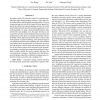Free Online Productivity Tools
i2Speak
i2Symbol
i2OCR
iTex2Img
iWeb2Print
iWeb2Shot
i2Type
iPdf2Split
iPdf2Merge
i2Bopomofo
i2Arabic
i2Style
i2Image
i2PDF
iLatex2Rtf
Sci2ools
ICASSP
2011
IEEE
2011
IEEE
Cooperative spectrum sensing based on matrix rank minimization
In cognitive radio (CR) networks, multi-CR cooperation typically takes place during spectrum sensing, to cope with wireless fading effects and the hidden terminal problem. The user cooperation gain not only offers channel diversity against fading, but also allows for reduced sampling costs per CR, which is particularly relevant when the monitored spectrum has very wide bandwidth. To attain a desired tradeoff between channel diversity and sampling costs, this paper develops a new cooperative spectrum sensing technique based on matrix rank minimization. In the absence of channel knowledge, CRs individually collect digital measurements from a region of the wide spectrum via selective filtering, with optional compressive sampling to further reduce sampling rates. The solutions representing all the measurements are modeled to possess a low rank property, with the rank order being the same as the size of the nonzero support of the monitored wide spectrum. Accordingly, a nuclear norm minimi...
Related Content
| Added | 21 Aug 2011 |
| Updated | 21 Aug 2011 |
| Type | Journal |
| Year | 2011 |
| Where | ICASSP |
| Authors | Yue Wang, Zhi Tian, Chunyan Feng |
Comments (0)

